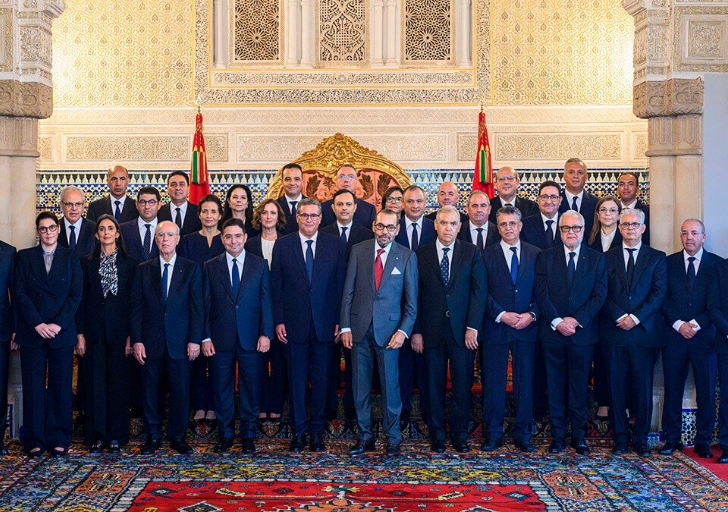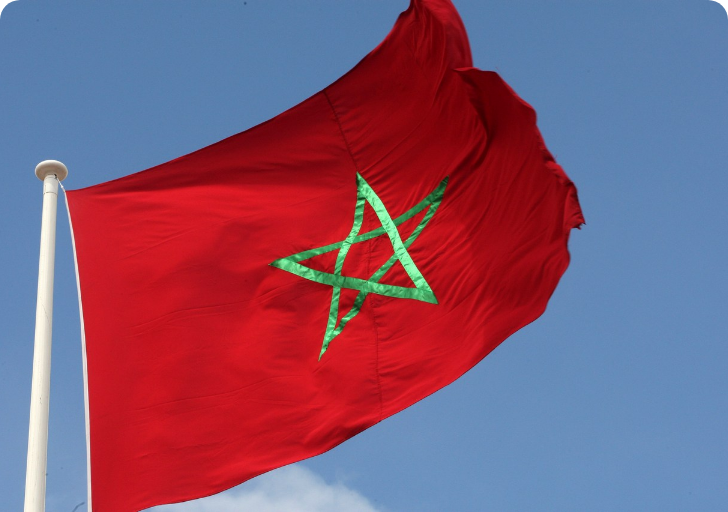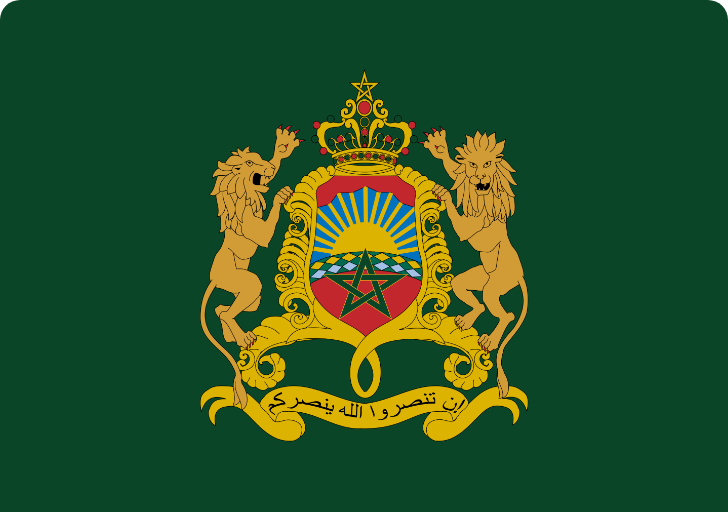HM the King Sends Speech to 1st Arab-European Summit
HM King Mohammed VI sent a speech to the first Arab-European Summit, which opened Sunday in Sharm El Sheikh, Egypt.
Here follows the full text of the royal speech, which was read out Monday by Head of Government, Saad Dine El Otmani:
"Praise be to God,May peace and blessings be upon the Prophet, His Kith and Kin
Your Excellency Mr. Abdel Fattah el-Sisi, President of the Arab Republic of Egypt, Host and Co-Chairman of the Summit,Your Excellency Mr. Donald Tusk, President of the European Council and Co-Chairman of the Summit,Your Majesties, Your Highnesses, Your Excellencies,Ladies and Gentlemen,
First of all, I should like to express my thanks and appreciation to His Excellency Mr. Abdel Fattah el-Sisi, President of the Arab Republic of Egypt and, through him, to the people of our sister nation, Egypt, for hosting this first Arab-European Summit and for the efforts made by the Egyptian Government to ensure its success.I also wish to thank Mr. Donald Tusk, President of the European Council for co-chairing the Summit.
My thanks also go to Her Excellency Ms. Federica Mogherini, the EU High Representative for Foreign Affairs and Security Policy, and His Excellency Mr. Ahmed Aboul Gheit, Secretary-General of the League of Arab States, for efficiently guiding the working groups which prepared the Summit’s work documents.
Your Majesties, Your Highnesses,Your Excellencies,
This is a pivotal moment in the Arab-European dialogue. Indeed, we have come together for this first ever Arab-European Summit, at a juncture marked by crucial geostrategic developments with a direct bearing on our two regions. This summit is a landmark event in our joint history. It reflects a common desire to take our relationship to a higher level. That would certainly have a tangible impact on security and stability in our regions. It would also open up promising prospects for peaceful coexistence between our peoples and contribute to the economic and social well-being they yearn for.
The summit which has brought us together today is of special importance to the Arab world. It sets the stage for a dialogue which has special significance as far as the Arab world’s relationship with its various partners is concerned - be they countries or regional and continental blocs and organizations. Naturally, the importance of our relationship has to do with history and with geographic proximity. Above all, however, this relationship reflects a common conviction and is the result of human, intellectual and cultural efforts rooted in constant interaction and mutual enrichment between Arab and European civilizations.
For decades now, the Kingdom of Morocco has had a special and fruitful relationship with its European partner, especially through the Advanced Status it has with the EU. My country looks forward to even closer relations with the EU based on partnership. Morocco is indeed ready to help turn Arab-European cooperation into an innovative partnership that builds upon the cultural heritage of each party, making Arab-European interaction a lever for the emergence of a solid, balanced relationship rooted in shared values, common interests, mutual esteem and constructive dialogue.
With that in mind, I believe this summit is a suitable opportunity to recall those cultural and human dimensions, and to build upon them to turn our dialogue into genuine cooperation based on a clear vision and realistic action plans in order to serve common interests and achieve mutual benefit.
Your Majesties, Your Highnesses,Your Excellencies,
Given the current state of Arab-European cooperation and its material and cognitive scope, I think it would be useful to undertake an objective, cool-headed assessment of its achievements, review its pillars, determine its strategic short and long-term priorities, and develop work methods to deliver better results.
Therefore, we should see to it today that our discussions and our dialogue focus on the ways and means to give concrete substance to this cooperation through the development of an integrated holistic vision concerning the kind of future we want for our regions. Such an endeavor calls for a rational classification of priorities, the definition of realistic objectives, the adoption of a proactive, participatory approach and the use of sophisticated, flexible work mechanisms.
I personally believe such an integrated vision requires that we lay emphasis on certain priorities, including the following:Firstly, Arab national security: this must remain an Arab matter, free from any external interference or influence; the importance of international efforts on the part of reliable partners should nonetheless be taken into account to prevent any breach of Arab security, for any violation of that security would inevitably undermine the security of Europe, even that of the entire world.
I must point out in this regard that the serious challenges facing the Arab world today - which threaten its security and stability - are sometimes due to the policies and practices of certain Arab countries towards fellow Arab nations. The elimination of such threats hinges on commitment to the principles of good-neighborliness, respect for the national sovereignty and territorial integrity of states and refraining from - or putting an end to - interference in the internal affairs of states.
Secondly, revival of the Arab world: Europe should help its Arab neighbors to achieve the kind of economic, scientific and technological development that helps reduce economic and social divides between partners. This can be done through tangible development projects that re-fashion the movement of investment and people and help bring about more balanced production systems that take into account common security, economic and social concerns.
Although the European Union is the Arab world’s second trade partner, and in spite of the fact that trade flows between the two sides are both significant and intensive, they still do not match our ambitions. Trade flows are also imbalanced: whereas 27% of the Arab world’s imports are from EU countries, only 11% of Arab exports go to Europe.
Thirdly, we need to make sure future partnerships pave the way for the emergence of a sound intellectual, cultural and information environment. It should be conducive to coexistence and cooperation between the peoples of the two regions and allow for the integration of generations and the promotion of the values of tolerance and acceptance of the other; stereotypes and exclusion, which only lead to conflict and antagonism, should be avoided.
We are looking forward to the advent of a sound relationship between the Arab world and Europe in the future. It should be free from ready-made judgments and should be preserved against the effects of passing events. We believe, in Morocco, that there is a fresh opportunity today to manage jointly the issues of migration and the fight against terrorism from various angles. We should use, to this end, an integrated, holistic approach combining shared responsibility and co-development.
In this regard, I hope this summit will be an opportunity to start giving shape to this ambitious project and laying down its mechanisms. This should not be too arduous since mechanisms and structures already exist, including the 5+5 Dialogue and the Union for the Mediterranean. As regards the latter, I hope a fresh start will be given to it through the operationalization of its bodies and the reactivation of its programs to inject strong momentum into Arab-European cooperation.
I wish to take this opportunity to call on regional Arab groupings - including the Arab Maghreb Union - to play their part in boosting relations with our European partners, and to overcome political obstacles and bilateral disagreements which hinder the achievement of progress and development.
Your Majesties, Your Highnesses,Your Excellencies,
Regardless of how optimistic we may be, or how legitimate our aspirations to build this cooperation may be, the fact is we need to remind ourselves of some of the main challenges facing our regions. Chief among these are the Palestinian question and the future of Al-Quds Al-Sharif – an issue to which I attach special importance in my capacity as Chairman of the Organization of Islamic Cooperation’s Al-Quds Committee. Allow me to take this opportunity to stress the need to safeguard the legal character of the holy city, which is part of the Palestinian territories occupied in 1967. This should be done within the framework of the two-state solution with a view to achieving a comprehensive peace for all peoples in the region, in accordance with the principles already agreed through our dialogue on the need to enable the Palestinian people to establish their independent state, with East Jerusalem as its capital.
Before concluding, I reiterate the Kingdom of Morocco’s readiness to engage in a full and substantial way in any fresh dynamic that would turn the Arab-European dialogue into genuine, meaningful cooperation - one that would significantly benefit countries in both regions and help fulfil their peoples’ aspirations and ambitions.Thank you.
Wassalamu alaikum warahmatullah wabarakatuh."
MAP 25 February 2019







